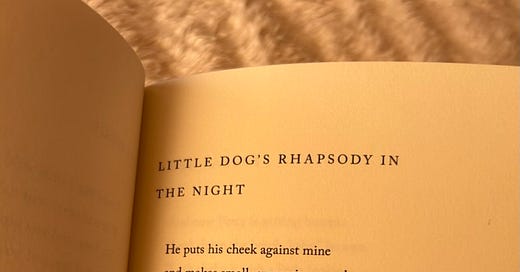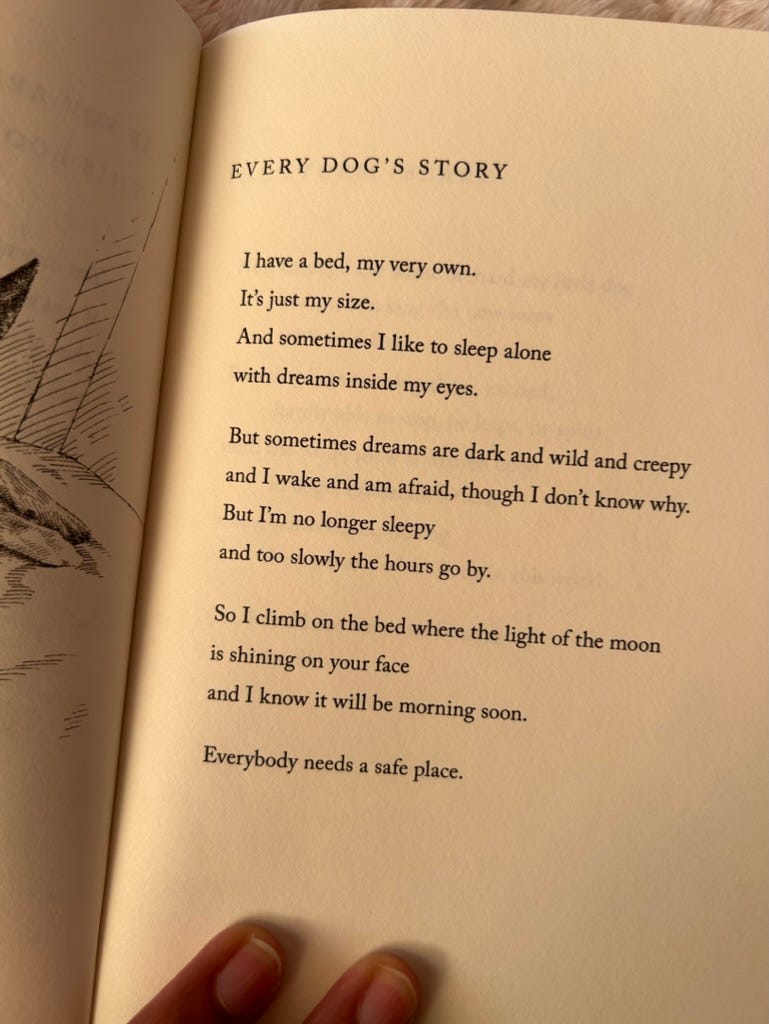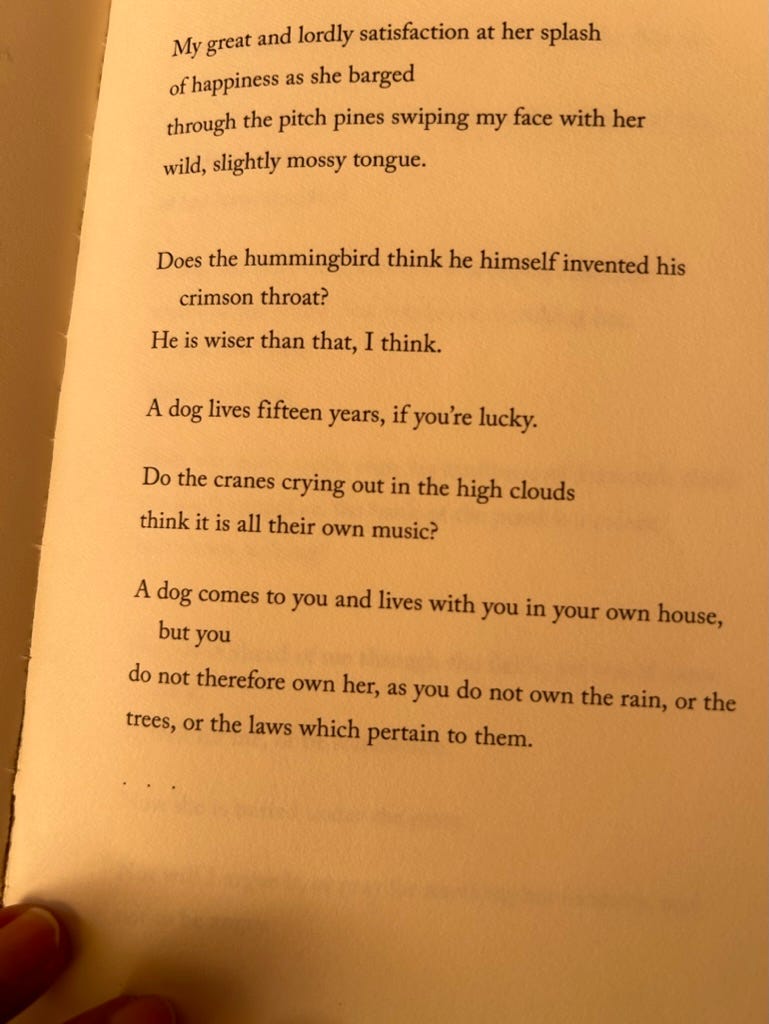Resources for Wildfire Recovery
Anti-Recidivism Coalition Fire Fighter Fund
National Day Laborer Organizing Network Immigrant Fire Relief Fund
Pasadena Humane Society Emergency Help Needed for Wildfire Relief
We Love LA: Wildfire Relief Events
2/8/2025 "I Love LA" Eaton Fire Relief Show with Proceeds To Benefit Sweet Relief Musicians Fund
Illustration
I had this idea for a painting of a dog in an overwhelmingly lush garden that was blindingly bright and full of all types of flowers surrounded by apple trees. I finished it just this week and while I have an impulse to keep adding increasingly small details, I told myself it’s done and that it’s okay for it to be done. I’m mulling over a few ideas for another picture book and I could easily see this as one of the pages. More to come on that soon I hope.
Inspiration
Mary Oliver’s Dog Songs provided me with much comfort during Scooter’s final few days and now after I’ve said goodbye. During Scooter’s final days on this mortal coil, I even read some of these poems to him. I chose some excerpts because they filled me with the same love, understanding, and companionship I felt with Scooter when he was alive.
Little Dog’s Rhapsody In The Night
He puts his cheek against mine
and makes small, expressive sounds.
And when I’m awake, or awake enoughhe turns upside down, his four paws
in the air
and his eyes dark and fervent.“Tell me you love me,” he says.
“Tell me again.”
Could there be a sweeter arrangement? Over and over
he gets to ask.
I get to tell.
On the hard days with Scooter, I could only reassure him that he wasn’t alone. And I love how Oliver captures the sweetness of this back-and-forth between dog and human. From a reassuring scratch to rushing to the veterinarian, every action is a way of saying “I love you” to your dog.
How It Is With Us, And How It Is With Them
We become religious,
then we turn from it,
then we are in need and maybe we turn back.
We turn to making money,
then we turn to the moral life,
then we think about money again.
We meet wonderful people, but lose them
in our busyness.
We’re, as the saying goes, all over the place.
Steadfastness, it seems,
is more about dogs than about us.
One of the reasons we love them so much.
Scooter’s presence was a grounding steadfastness that Oliver describes. Through so many life changes, marriage, job changes, significant moves, and good and bad days, Scooter was always there with a little smile.
Every Dog’s Story
I have a bed, my very own.
It’s just my size.
And sometimes I like to sleep alone
with dreams inside my eyes.
But sometimes dreams are dark and wild and creepy
and I wake and am afraid, though I don’t know why.
But I’m no longer sleepy
and too slowly the hours go by.
So I climb on the bed where the light of the moon
is shining on your face
and I know it will be morning soon.
Everybody needs a safe place.
During the last couple of months of Scooter’s life, I often camped out with him in the living room. Nights had become hard for him; endless pacing and confusion. Michael would find us the following morning with me on the sofa, my arm curved towards the floor, and Scooter on his orthopedic, with my hand resting on some part of him.
Excerpt from Her Grave
Does the hummingbird think he himself invented his crimson throat? He is wiser than that, I think.
A dog lives fifteen years, if you’re lucky.
Do the cranes crying out in the high clouds think it is all their own music?
A dog comes to you and lives with you in your own house, but you do not therefore own her, as you do not own the rain, or the trees, or the laws which pertain to them.
This last poem, “Her Grave,” is a bittersweet reminder that we don’t truly own anything. Everything we love (dogs, family, flowers, pasta, etc.) is subject to time's fleeting nature, not our concepts of property.
More on incomparable Mary Oliver here:
Ideas
In the Victorian Era, keeping autograph books was a popular pastime. You would ask friends and family to leave their autographs and write messages, poems, lines of verse, and so on. A popular type of autograph book was known as a confession album. These confession albums would have questionnaires with questions that ranged from “Where would you like to live?” to “What is the trait you most deplore in yourself?”— sort of an early personality test, I suppose. Just as you might have passed around your yearbook for friends and classmates to sign, the confession album owner would pass it to friends and have them each fill out the questionnaire. A young Marcel Proust filled out the questionnaire at the behest of a friend, and it wasn’t until years after he had passed that the answers to his questionnaire took on much more considerable cultural significance. Eventually, the set of questions became known as the Proust Questionnaire, and it’s been adopted as a style of interview, such as by Vanity Fair. They’re succinct and surprisingly poignant. (Some of the interviews I enjoyed: Monica Lewinsky, Vera Wang, Gloria Steinem.) As you might have guessed, I completed the questionnaire myself one evening. I hand-wrote them in my journal and haven’t decided whether to share my answers. It’s the kind of introspective exercise I like to do at the beginning of the year, and I think I’ll do it again next year. It was enjoyable, provided me with clarity, and helped me consider some preferences I hadn’t had before. I found the exercise worthwhile, cathartic, and grounding during a tumultuous time.
During this time of devastating fires, the inauguration of a president who shouldn’t be anywhere near the Oval Office, and a burgeoning “quademic”, we should probably look to birds and how they appear to set aside their differences in favor of cooperation during the winter. During a time of extreme cold and less availability of nutrients, one writer describes how the birds she and her husband provided food for during the winter seemed to “band together in the cold. In such weather, they waste little energy in squabbling. Their cooperation wasn’t symbolic any more than the cardinals on New Year’s Day were merely a symbol. Most songbirds are less territorial in winter because the hormones responsible for breeding behavior have not yet begun to rise. They cooperate as compensation for leafless trees and cold temperatures, working together to find food sources and evade predators, staying warm by flocking up.” After the Eaton Fire broke out, I saw this collective community and care coming together firsthand in Pasadena. Immediately, information and resources were shared, including location sites to drop off and pick up much-needed protective gear, water, medicines, etc. People give what they can, their love, time, and resources to help heal and rebuild. We have to care for one another, and we have to be brave during this winter.
“The secret is not to be frightened…” Fear stops us from taking chances on ourselves and being vulnerable and keeps us from others. At this time, it feels especially vital and radical not to be afraid to live authentically and true to who we are and to go for what we’ve always wanted to try: to be a beginner.
Other ideas I liked:
Ending Quote
I’ll end with this quote from David Lynch, speaking to the New York Times in 1989:
I don’t know why people expect art to make sense when they accept the fact that life doesn’t make sense.











very touching and moving. 🥰🐶